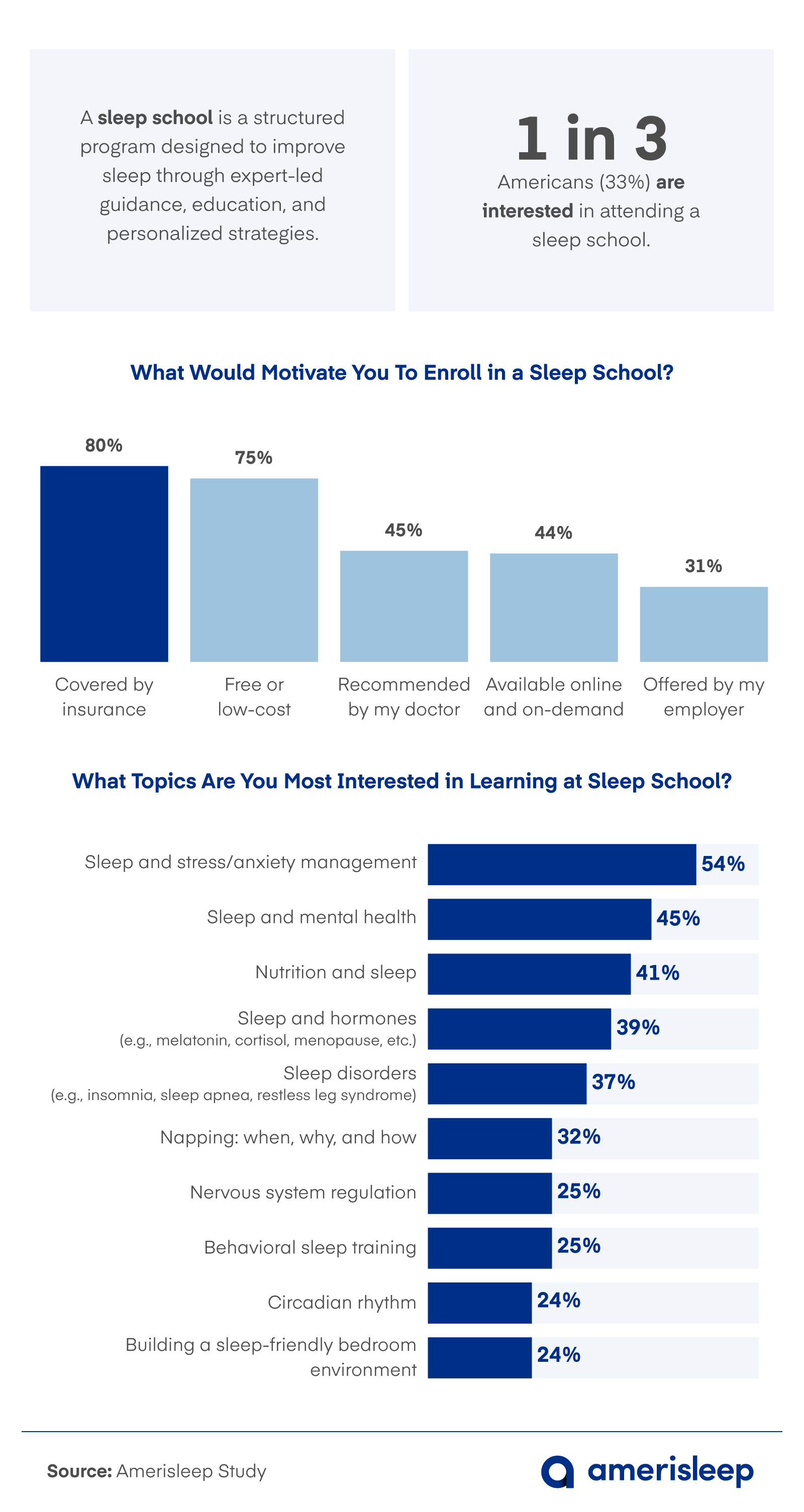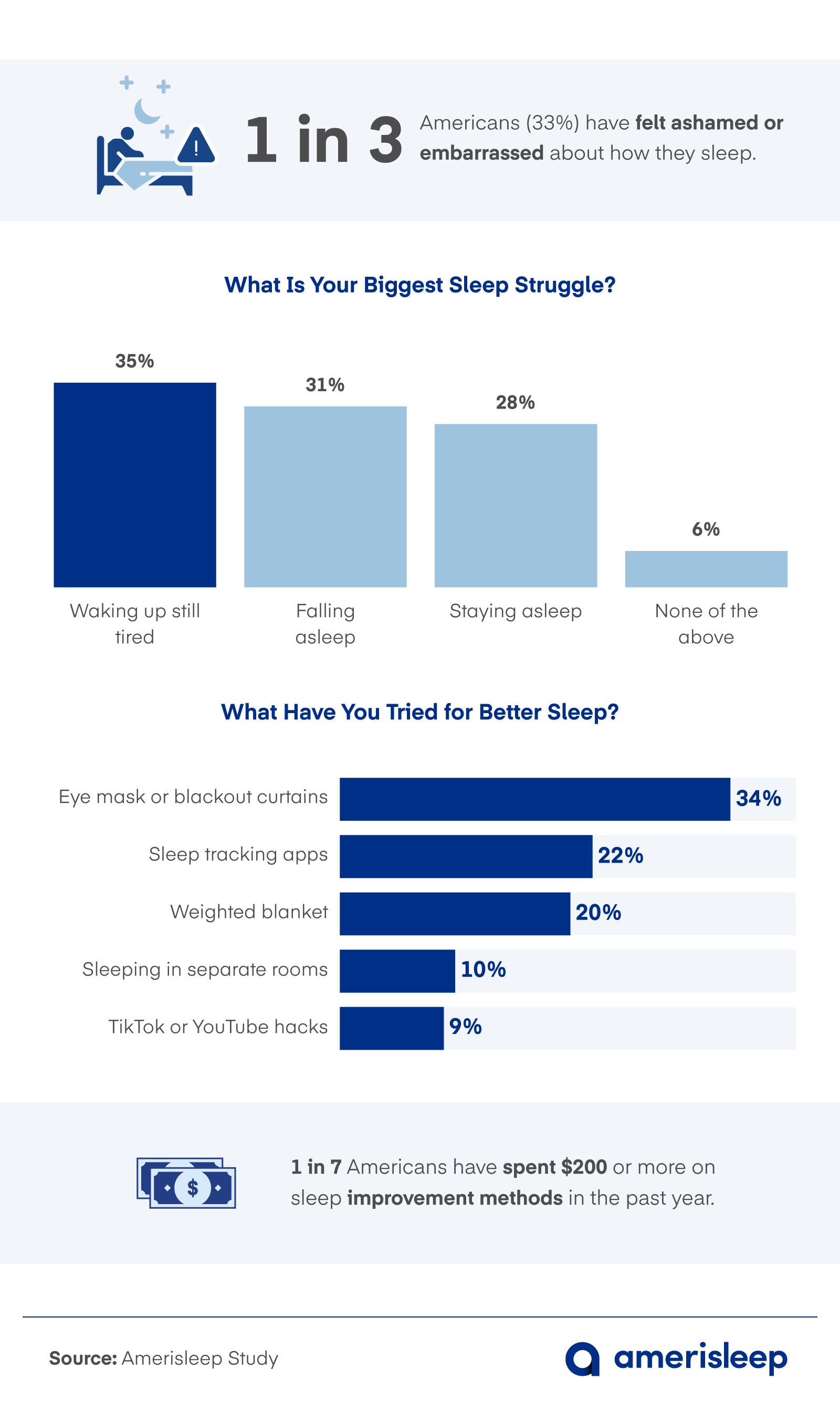Many adults admit they never really learned how to sleep well, and now they are feeling the consequences. In today’s always-on culture, from constant screen time to nonstop responsibilities, getting a good night’s rest has become a serious challenge.
To explore this modern sleep crisis, we surveyed 1,000 Americans about their struggles with rest and whether they would be willing to attend a “sleep school” designed to help. What we found reveals just how eager people are for expert help, and how deeply sleep struggles affect daily life.
Key Takeaways
- 1 in 3 Americans are embarrassed about how they sleep.
- 1 in 7 Americans have spent $200 or more on sleep improvement.
- More than 1 in 10 Americans (11%) have turned to Google and ChatGPT for help falling asleep.
- Over 2 in 5 Americans (41%) have turned to the internet or AI for help falling asleep.
- 2 in 5 Americans (44%) have missed work, school, or an event because of poor sleep.
- 1 in 3 Americans (33%) are interested in attending a “sleep school,” and 3% have already done so.
- Over 4 in 5 Americans (84%) think sleep courses should be covered by health insurance.
- Nearly 4 in 5 Americans (78%) think schools should teach sleep as part of health education.
Why Americans Are Ready To Enroll in Sleep School
Across the country, many adults are open to the idea of going back to school. It’s not for a degree, but to learn how to sleep better. Interest in a structured, expert-led sleep course is growing, especially among certain generations feeling the toll of poor rest.


One in three Americans expressed interest in attending a “sleep school,” and a smaller group, 3%, have already done so. Gen X and millennials showed the strongest enthusiasm, with 36% from each group interested, followed by 30% of Gen Z and only 16% of baby boomers.
On average, Americans said they would be willing to pay $65 for such a course. Gen Xers were the most willing to invest, at $80, followed by millennials at $65, Gen Z at $55, and boomers at $40. But nearly 4 in 5 Americans (78%) said schools should teach sleep as part of health education.
What would motivate people to enroll? Most respondents (84%) said health insurance should cover sleep courses, and more than 80% said they would be more likely to attend if that were the case.
Another 75% would sign up if sleep school were free or low-cost. Doctor recommendations and the convenience of online, on-demand access were also top motivators.
As for what they hope to learn, adults crave practical and personalized guidance. The most popular topics of interest among our respondents included managing stress and anxiety (54%), understanding how sleep affects mental health (45%), and using nutrition to improve sleep (41%).
Other high-interest subjects were how hormones interact with sleep (39%) and common disorders like sleep apnea and restless leg syndrome (34%).
Preferences also varied by generation. Gen Z was especially focused on mental health, ranking it alongside stress management as top concerns (both at 56%).
Millennials echoed those priorities, while Gen X expressed strong interest in hormone-related issues (45%) and stress (58%). Baby boomers were most interested in sleep disorders and nutrition.
Why People Are Struggling With Sleep
Many Americans don’t just want to sleep better, they want to feel confident and secure in their rest. For some, that could mean overcoming feelings of shame or embarrassment about how well they sleep, or even the pressure to pretend they’re sleeping better than they are.


One in three Americans have felt embarrassed about how they sleep, with Gen Z leading the way at 39%, followed by millennials (35%), Gen X (29%), and baby boomers (23%).
Nearly half of Gen Zers admitted to lying about their sleep habits, often to partners, friends, or even their own doctors. Another 1 in 20 Gen Zers admitted to lying about their sleep to their boss or coworkers.
Waking up tired was the most common sleep complaint (35%), followed by trouble falling asleep (31%) and staying asleep (28%). People have tried a wide range of strategies to improve rest — the most common being eye marks or blackout curtains (34%), sleep tracking apps (22%), and weighted blankets (20%).
The struggle runs deep. Two in five Americans said they have missed work, school, or an important event because of poor sleep. When they cannot sleep, 41% turn to the internet or AI for help, including Google, ChatGPT, or both. In fact, 11% reported using both tools, and 3% said they consulted ChatGPT alone.
On average, Americans have spent $50 in the past year on sleep products, supplements, or services. But some (1 in 7) have spent $200 or more on sleep improvement.
For more perspectives we’ve curated on AI and sleep, check out our Dreaming of AI survey results.
FAQs
Can I benefit from hiring a sleep coach?
A sleep coach can be valuable if you’re struggling with persistent sleep issues that haven’t improved with basic sleep hygiene changes, or if you need personalized guidance and accountability to establish better sleep habits.
They can help identify specific behavioral patterns disrupting your sleep, create customized routines, and provide ongoing support as you implement changes.
However, it’s important to distinguish between sleep coaches (who focus on behavioral strategies) and medical sleep specialists. If you have symptoms of sleep disorders like sleep apnea, restless leg syndrome, or chronic insomnia, you should consult a doctor or sleep medicine specialist first.
How can I separate good sleep advice from bad?
Good sleep advice is typically evidence-based, comes from credible sources like sleep medicine professionals or peer-reviewed research, and focuses on gradual, sustainable changes rather than quick fixes or extreme measures.
Be wary of advice that promises miraculous results, promotes expensive supplements or gadgets as cure-alls, or contradicts well-established sleep science principles like the importance of consistent sleep schedules and dark, cool sleeping environments.
When evaluating sleep advice, look for recommendations that acknowledge individual differences and suggest consulting healthcare providers for persistent problems, rather than one-size-fits-all solutions.
Is it wrong to trust an AI for sleep advice?
While AI can provide helpful general information about sleep hygiene and evidence-based sleep practices, it shouldn’t be your only source for sleep guidance, especially if you have ongoing sleep problems.
AI systems can make mistakes, may not have access to the most current research, and cannot assess your individual medical history or perform the kind of personalized evaluation that a healthcare provider can offer.
It’s best to use AI-generated sleep advice as a starting point for understanding general principles, but always verify important information with healthcare professionals and consider AI suggestions as complementary to, not a replacement for, proper medical consultation when dealing with persistent sleep issues.
When do sleep troubles need medical intervention?
You should seek medical intervention if you consistently have trouble falling asleep or staying asleep for more than three weeks, despite practicing good sleep hygiene, as this may indicate chronic insomnia or an underlying sleep disorder.
Warning signs that require immediate medical attention include loud snoring with breathing pauses (possible sleep apnea), excessive daytime sleepiness that interferes with daily activities, or unusual behaviors during sleep like sleepwalking or violent movements.
And if sleep problems are significantly impacting your work performance, relationships, mental health, or if you’re experiencing symptoms like morning headaches, difficulty concentrating, or mood changes, it’s time to consult a healthcare provider who can properly diagnose and treat potential sleep disorders.
How do I know if I’m getting enough sleep at night?
The most reliable indicator of adequate sleep is how you feel during the day. If you wake up feeling refreshed and can maintain alertness and energy throughout the day without excessive caffeine or naps, you’re likely getting sufficient sleep.
Most adults need 7-9 hours of sleep per night, but individual needs vary, so pay attention to whether you’re falling asleep within 15-20 minutes of lying down and sleeping through most of the night without frequent awakenings.
Other positive signs include stable mood, good concentration, the ability to function well during your normal daily activities, and not feeling an overwhelming urge to sleep during inappropriate times like while driving or in meetings.
How can technology help and hurt my sleep?
Technology can significantly help your sleep through tools like sleep focused apps that monitor your sleep patterns and help you identify trends, white noise machines or apps that create consistent ambient sounds, and smart thermostats that maintain optimal bedroom temperature throughout the night.
Sleep-focused apps can guide you through relaxation techniques or breathing exercises before bed, while blue light filtering software and amber-tinted glasses can reduce the sleep-disrupting effects of screens in the evening.
However, technology can also severely harm your sleep quality by exposing you to stimulating blue light from phones, tablets, and computers, which suppresses melatonin production and delays your natural sleep onset, especially when used within an hour of bedtime.
The constant notifications, engaging content, and mental stimulation from social media, streaming services, or work emails can keep your mind active when it should be winding down, making it much harder to fall asleep and achieve deep, restorative sleep cycles.
Learning To Rest One Lesson at a Time
In a society that rewards hustle over health, it is no wonder so many adults are eager to relearn sleep. This growing interest in structured rest education, from courses to AI tools, reveals a desire to fix what’s broken in our routines. Americans are ready to take sleep seriously, one lesson at a time.
Methodology
We surveyed 1,000 Americans to investigate America’s modern sleep crisis by uncovering how many adults are failing at rest and revealing the surprising demand for a structured “sleep school” to fix it.
The average age was 40; 50% were female and 50% were male. Generationally, 8% were baby boomers, 23% were Gen X, 55% were millennials, and 13% were Gen Z. Any percentages that don’t total 100 are due to rounding.
About Amerisleep
Amerisleep is a leader in sleep innovation, offering eco-friendly, high-performance mattresses designed to improve rest and well-being. From advanced memory foam to targeted support zones, Amerisleep’s products are built to help you get the deep, restorative sleep your body needs.
Fair Use Statement
If you would like to share our findings, you are welcome to do so for noncommercial purposes. Just be sure to include a link back to this page and credit Amerisleep as the source.










